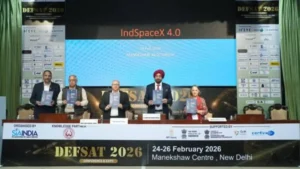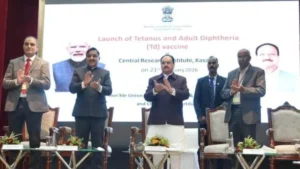In a significant advancement for India’s space sector, the Indian Space Research Organisation (ISRO) is set to launch the European Union’s Proba-3 Solar Observation Mission in December from Sriharikota. The satellite, arriving at Sriharikota, is designed to study the Sun’s faint corona, a crucial aspect of solar science. This marks India’s third collaboration with the EU in space, following the earlier launches of Proba-1 and Proba-2.
The mission, launched aboard the PSLV-XL rocket, reflects India’s growing role in global space exploration and scientific research. Union Minister Jitendra Singh highlighted ISRO’s expanding capabilities in space missions, emphasizing the country’s aim to achieve remarkable goals like landing the first Indian on the Moon by 2040 and establishing the Indian Space Station (Bharatiya Antariksha Station, BAS) by 2035.
Proba-3 Solar Mission: Key Highlights
The Proba-3 satellite will offer valuable data on solar corona dynamics, enhancing solar science knowledge. It represents India’s collaboration with the EU for advanced space exploration, building on past successes like the Chandrayaan-3 mission and earlier Proba satellite launches.
Ambitious Goals: India’s Space Vision by 2040
India aims to make a massive leap in space exploration, targeting milestones such as sending the first Indian to the Moon by 2040 and establishing BAS by 2035. These ambitious goals highlight India’s determination to expand its space leadership and increase its contribution to the global space economy from 2% to 10%.
ISRO’s Vision for Self-Reliance in Space Innovation
ISRO is focused on achieving “Atmanirbharta” (self-reliance) in space technology through strategic policies, investments, and collaborations. ISRO Chairman S Somanath emphasized the challenges in space exploration, including building and launching large platforms, while stressing the need for industry participation and investment.
Future Space Economy: Collaboration and Growth
The space sector is projected to play a significant role in India’s economic growth, with space investments yielding high returns. With a ₹1,000-crore venture capital fund supporting space startups, India is on track to lead the space innovation race, creating competitive space companies that can thrive in the global market.
EU-India Space Collaboration: A Strong Partnership
EU Ambassador Hervé Delphin underlined the strong partnership between India and the EU, with shared goals of peaceful space use and strategic autonomy. The collaboration aims to enhance joint projects in climate monitoring, cybersecurity, and exploration, ensuring mutual growth and fostering responsible space practices.




 Google Launches Nano Banana 2 Powered by...
Google Launches Nano Banana 2 Powered by...
 CERT-In, SIA-India Release New Space Cyb...
CERT-In, SIA-India Release New Space Cyb...
 Made in India: Nadda Launches Indigenous...
Made in India: Nadda Launches Indigenous...








